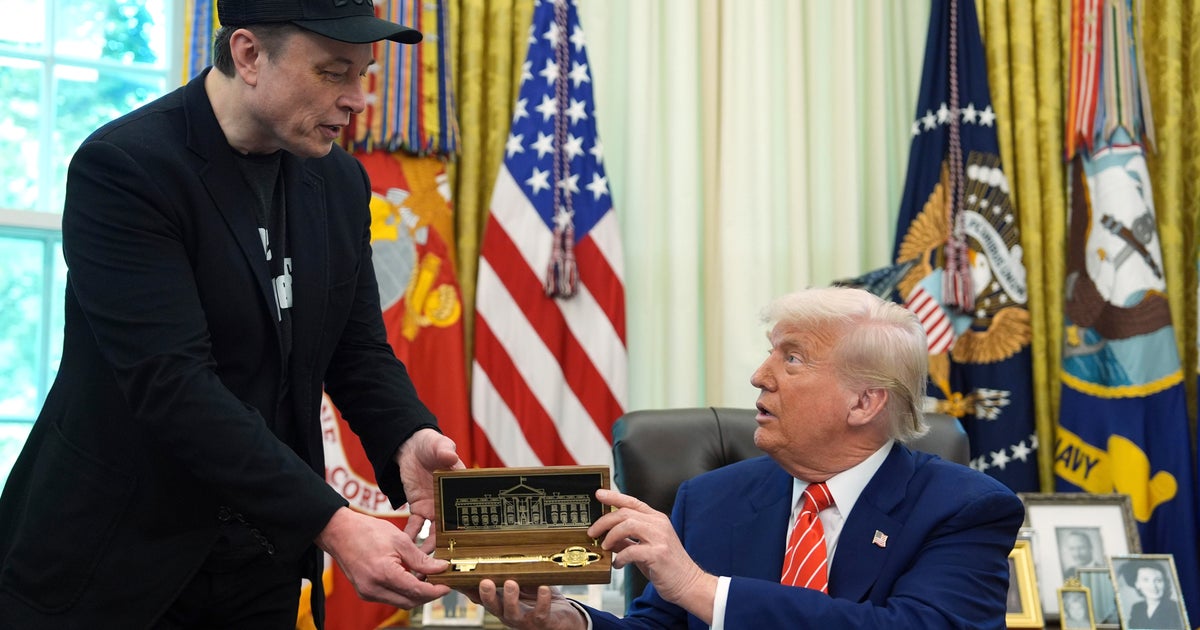Supreme Court halts lower court orders requiring DOGE to hand over information about work and personnel
Washington — The Supreme Court on Friday halted lower court orders that required the White House's Department of Government Efficiency to turn over information to a government watchdog group as part of a lawsuit that tests whether President Trump's cost-cutting task force has to comply with federal public records law.
The order from the high court clears DOGE for now from having to turn over records related to its work and personnel, and keeps Amy Gleason, identified as its acting administrator, from having to answer questions at a deposition. Justices Sonia Sotomayor, Elena Kagan and Ketanji Brown Jackson dissented.
"The portions of the district court's April 15 discovery order that require the government to disclose the content of intra–executive branch USDS recommendations and whether those recommendations were followed are not appropriately tailored," the court said in its order. "Any inquiry into whether an entity is an agency for the purposes of the Freedom of Information Act cannot turn on the entity's ability to persuade. Furthermore, separation of powers concerns counsel judicial deference and restraint in the context of discovery regarding internal executive branch communications."
The Supreme Court sent the case back to the U.S. Court of Appeals for the D.C. Circuit for more proceedings.
Chief Justice John Roberts temporarily paused the district court's order last month, which allowed the Supreme Court more time to consider the Trump administration's bid for emergency relief. A district judge had ordered DOGE to turn over documents to the group, Citizens for Responsibility and Ethics in Washington, by June 3, and for Gleason's deposition to be completed by June 13.
The underlying issue in the case involves whether DOGE is subject to the Freedom of Information Act. CREW argues that the cost-cutting task force wields "substantial independent authority," which makes it a de facto agency that must comply with federal public records law.
The Justice Department, however, disagrees and instead claims that DOGE is a presidential advisory body housed within the Executive Office of the President that makes recommendations to the president and federal agencies on matters that are important to Mr. Trump's second-term agenda.
DOGE's agency status was not before the Supreme Court, though the high court may be asked to settle that matter in the future. Instead, the Trump administration had asked the justices to temporarily halt a district court's order that allowed CREW to gather certain information from DOGE as part of its effort to determine whether the task force is an advisory panel that is outside FOIA's scope or is an agency that is subject to the records law.
The judge overseeing the dispute, U.S. District Judge Christopher Cooper, had to turn over certain documents to the watchdog group by June 3 and to complete all depositions, including of Gleason, by June 13.
Mr. Trump ordered the creation of DOGE on his first day back in the White House as part of his initiative to slash the size of the federal government. Since then, DOGE team members have fanned out to agencies across the executive branch and have been part of efforts to shrink the federal workforce and shutter entities like the U.S. Agency for International Development and the U.S. Institute of Peace.
DOGE has also attempted to gain access to sensitive databases kept by the Internal Revenue Service, Social Security Administration and Office of Personnel Management, prompting legal battles.
In an effort to learn more about DOGE's structure and operations, CREW submitted an expedited FOIA request to the task force. After it did not respond in a timely manner, CREW filed a lawsuit and sought a preliminary injunction to expedite processing of its records request. The organization argued that DOGE was exercising significant independent authority, which made it an agency subject to FOIA.
Cooper granted CREW's request for a preliminary injunction in March and agreed that FOIA likely applies to DOGE because it is "likely exercising substantial independent authority much greater than other [Executive Office of the President] components held to be covered by FOIA."
He then allowed CREW to conduct limited information-gathering, which the watchdog group said aimed to determine whether DOGE is exercising substantial authority that would bring it within FOIA's reach. A federal appeals court ultimately declined to pause that order, requiring DOGE to turn over the documents sought by CREW.
In seeking the Supreme Court's intervention, Solicitor General D. John Sauer said CREW is conducting a "fishing expedition" into DOGE's activities. He warned that if Cooper's order remains in place, several components of the White House, such as the offices of the chief of staff and national security adviser, would be subject to FOIA.
"That untenable result would compromise the provision of candid, confidential advice to the president and disrupt the inner workings of the Executive Branch," Sauer wrote. "Yet, in the decisions below, the court of appeals and district court treated a presidential advisory body as a potential 'agency' based on the persuasive force of its recommendations — threatening opening season for FOIA requests on the president's advisors."
But lawyers for CREW told the Supreme Court in a that the Justice Department's position "would require courts to blindly yield to the Executive's characterization" of the authority and operations of a component of the Executive Office of the President.
They said adopting the Trump administration's approach to DOGE would give the president "free reign" to create new entities within the Executive Office of the President that exercise substantial independent authority but are shielded from transparency laws.
"Courts would be forced to blindly accept the government's representations about an EOP unit's realworld operations, unable to test those representations through even limited discovery," CREW's lawyers wrote. "It is that extreme position, not the discovery order, that would 'turn[] FOIA on its head.'"




